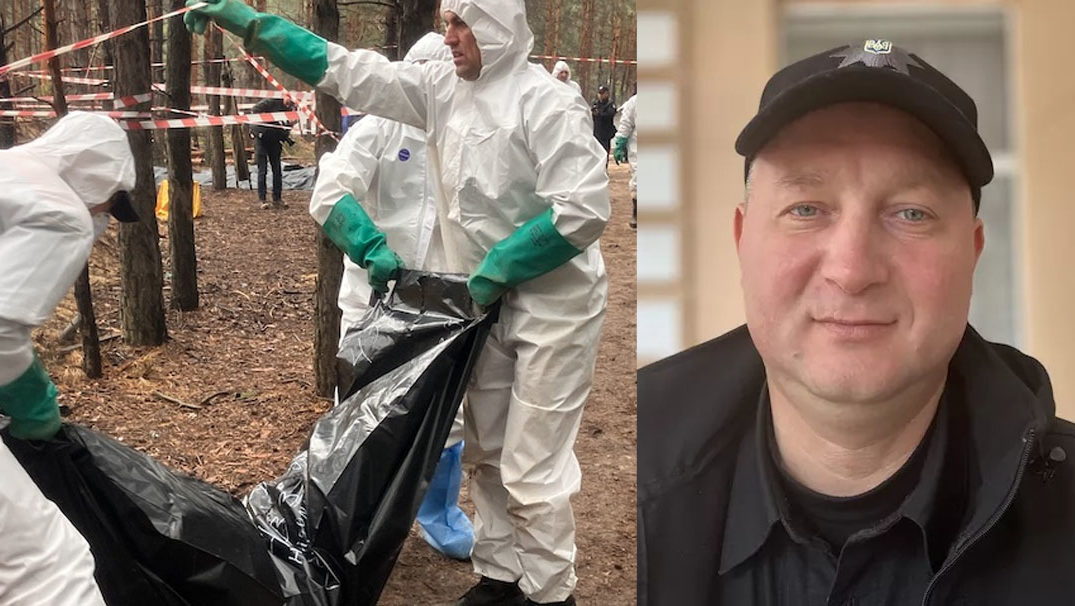After the liberation of Izium from Russian occupation on 10 September in Ukraine’s offensive in northeastern Ukraine, a mass burial site was found. 447 bodies, including 22 soldiers, have been exhumed. Most of the exhumed bodies have signs of violent death, Head of the Kharkiv Oblast Military Administration Oleh Syniehubov said.
As the law enforcement officers completed the exhumation of 447 bodies from the mass grave in Izium, Kharkiv Oblast, Euromaidan Press spoke to Volodymyr Tymoshko, the Chief of Police of the Kharkiv Oblast, about the changed role of the police during the war.
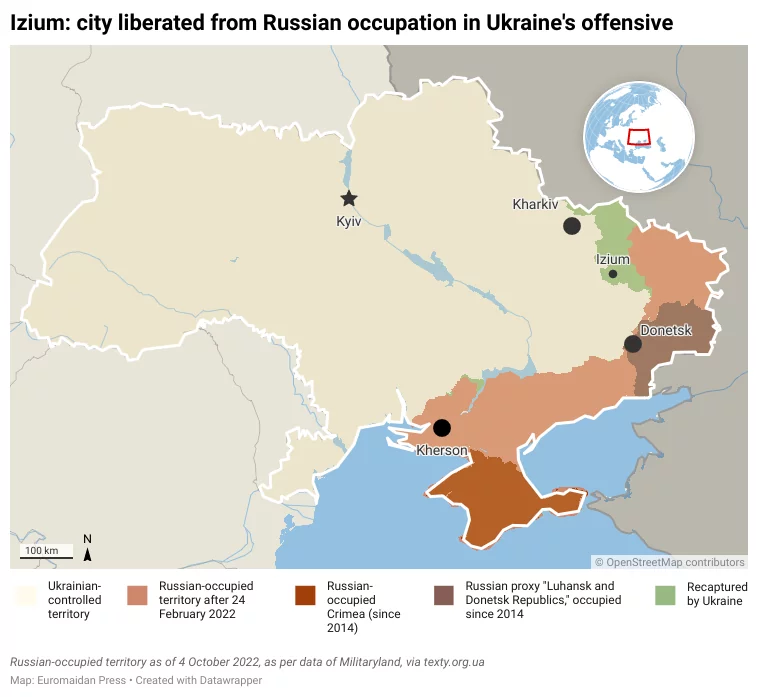
Police document war crimes so Putin can suffer the fate of Goering after the Nuremberg trial
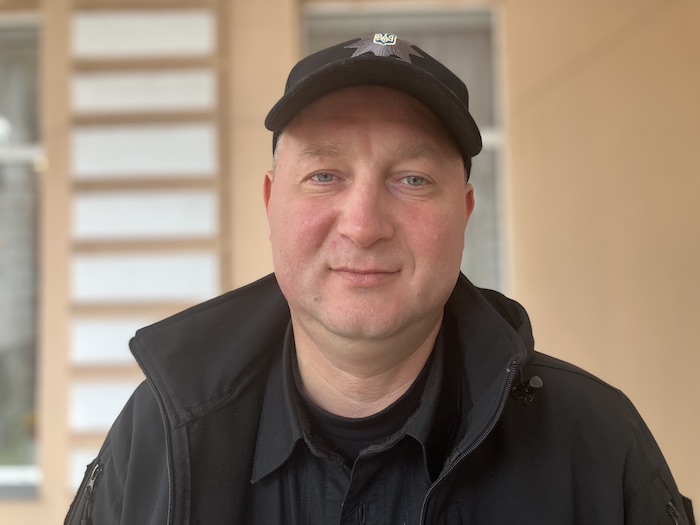
Zabrisky: Yesterday, I went to the places of mass burial in Izium and the police were working there. Could you comment on the police’s functions there?
The police have discovered the burial sites. We work in all liberated cities, villages, and towns of the Kharkiv Oblast. During the occupation, the police were always the last to leave the cities that were under the threat of occupation, such as Izium, Kupiansk, Borova, and other locations. And the police were the first to follow the Armed Forces of Ukraine during the de-occupation. As soon as Balakliya and Izium were liberated, we started our work.
First of all, we do home visits to every household and interview all citizens about what had happened, and accept statements about the crimes committed by the Russian military. We accept a lot of reports: thefts, tortures, and murders. We discover all this while surveying the people. In addition, surveying allows for the assessment of the number of people in the occupied territory, so the local authorities can provide humanitarian assistance to these people. We listen to people—they have tears in their eyes while telling their stories. In the course of such surveys, we learned about the places where the Russians buried the bodies of Ukrainian citizens, in an attempt to hide them.We do everything procedurally because we want the leadership of Russia to have the same fate as Goering had in Nuremberg.
The investigative actions were carried out and the place of the largest mass burial of people so far was discovered, with 447 bodies. Women, children, men, civilians, and military personnel. Mostly, peaceful citizens. We noted that many bodies had signs of torture. Some had their hands tied up, some had ropes around their necks. Yesterday, we have retrieved a body of a man who had a bullet wound in the back of his head. We understand that this man was shot.
Unfortunately, we found other places of burial and the police are working on the investigation. We document everything within the framework of criminal procedural legislation. We do everything procedurally because we want the leadership of Russia to have the same fate as Goering had in Nuremberg. So that the whole world can see it. And we can see a legal sentence and a rope around his neck.
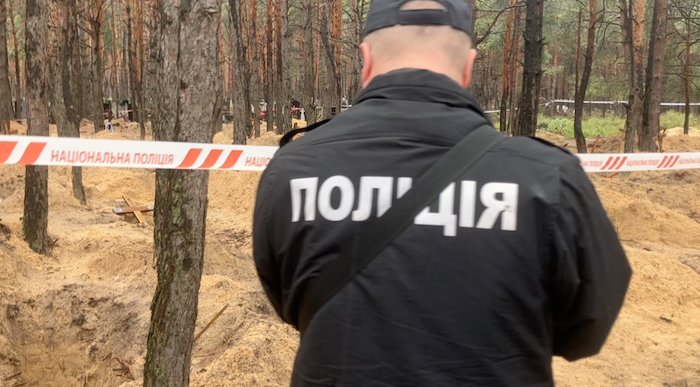
The Russians just torture Ukrainians for the sake of torture
Zabrisky: What is your take on what happened in Izium?
What is Izium? It is Auschwitz, 1945. Yes, maybe on a smaller scale, fortunately. However, the Russians were only there for six months. And there were many more Germans in Auschwitz. However, from the number of people killed, we can say that these are very similar situations.The occupiers simply have a lust for violence and a thirst to see the suffering of other people
We have been recording these facts since February 24 and we state that the Russians behaved the same way the Nazis behaved from 1939 to 1945. In the occupied territories, there is lawlessness, the absence of the right to live, and a risk of being killed, not for committing any crime. They killed just for the sake of killing. I don’t know what to call it. This is an insane situation when the occupiers simply have a lust for violence and a thirst to see the suffering of other people. No rhyme, no reason. That is, they do not even ask for information of a military nature. They just torture for the sake of torture.
It’s like mentally sick individuals who torture animals. And now we state that this is exactly what is being done to our people, to Ukrainians, by Russians. And I am sure, it is not just Putin’s fault. The people of Russia are to blame for this. The whole nation got stuck in the 14th-15th centuries. That’s how they were under Ivan the Terrible–that’s where they remain mentally.
Plus, we see how their behavior and their way of living. We enter the premises where they stayed and it is shocking. They defecate in one corner and eat in another. They live in squalor in one room. They steal everything. Stolen toilet seats have already become a running joke.
https://twitter.com/euromaidanpress/status/1573400548245929985
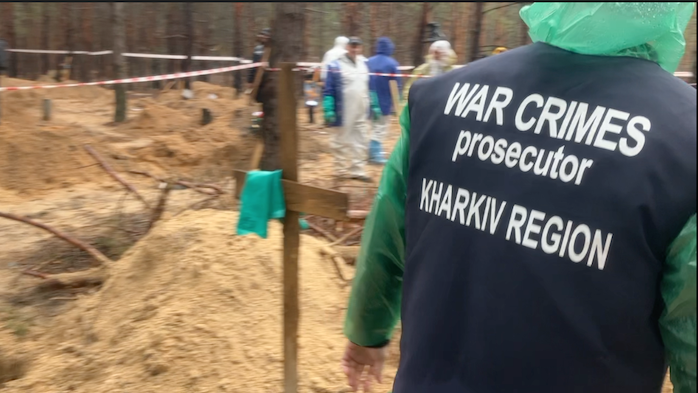
Russian occupation of Izium: brainwashing at gunpoint
Zabrisky: I spoke with people in Izium and Kharkiv. Quite a few people who suffered from the shelling lost their loved ones and home, said: “Russians are not bad people. They just received their order.” My question: Was it propaganda that these people received in the information vacuum? Stockholm syndrome, a coping mechanism, responsible for the victim’s empathy with the abuser?
You have no idea what happened to these people for six months. It’s not just propaganda, it’s brainwashing at gunpoint.
Zabrisky: What did the Russians do?
When we entered one of the cities, a five-year-old child approached our soldier and said: “Uncle, is it okay that I don’t speak Ukrainian well? You won’t kill me?” [Apparently, the Russians brainwashed the locals into thinking that the Ukrainian Army are violent nationalists who are ready to kill for the Ukrainian language – Ed] This is how much the Russians intimidated the population. When they entered any city, they removed everything in Ukrainian, all signs and posters. They simply removed the Ukrainian language. They burned books in Ukrainian. They said that Ukrainians as a nation do not exist. “You’ve been fooled. You’re not Ukrainians, you’re Russians. And anyone who calls themselves a Ukrainian is a Nazi.”This is genocide. Ordinary genocide.
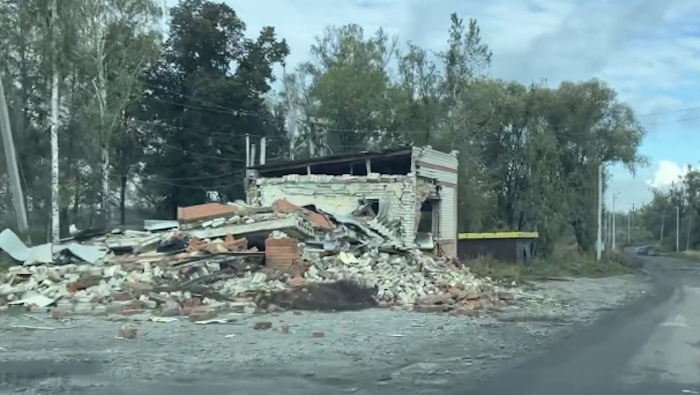
Russians killed their wounded, bombed a Ukrainian refrigerator train with Russian dead soldiers
Zabrisky: I saw corpses of Russian soldiers in the fields near Izium. What is being done with them?
We take samples for expertise from the bodies of Russian servicemen so that their relatives in Russia can identify their relatives and later bury them. After that, the bodies of Russian servicemen are kept in freezers, even though we do not have enough storage facilities for our own citizens. Nevertheless, the bodies of Russian soldiers are kept properly.
This war is the first war in the history of mankind, in which one side does not observe the rules of war developed over millennia, such as respect for the adversary. The Russians bomb the civilian population with weapons prohibited by international conventions, and they completely ignore international law. They no longer perceive international law as a deterrent tool. And they treat our fallen soldiers without such regard.
Zabrisky: Did the Russian military bomb the trains with the bodies of their own soldiers in Kharkiv?
Yes, they bombed the place where the wagons were located, with refrigerators with freezers, in which the bodies of their soldiers were stored. Firstly, they did it so that the bodies of the soldiers do not return [home] and to avoid paying the compensation money. They tell relatives that if someone is missing, the families are not entitled to payments. Secondly, they hide their losses. Because if all the corpses are brought to Russia at the same time there will be a day of mourning in each of their villages.
This situation happens along the entire front line, not only in the Kharkiv Oblast. They do not pick up the bodies from the battlefield. Back in March, we drew attention to the fact that when our troops took the village of Mala Rohan, the Russians killed all the wounded, although they had the opportunity to take them out. This fact has been confirmed by us.
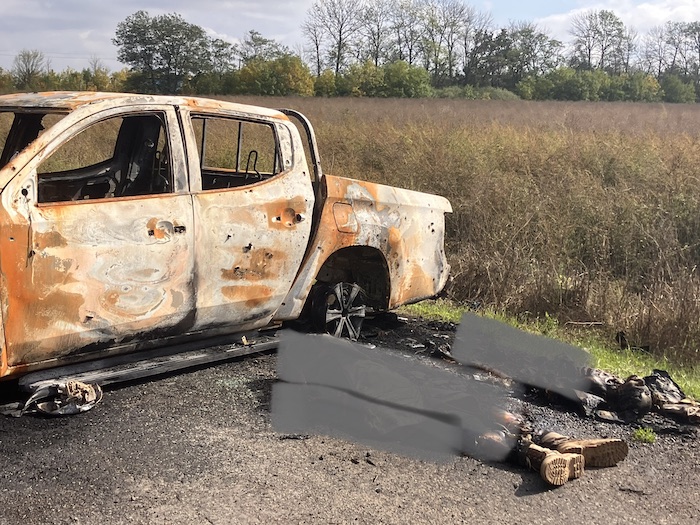
Ukrainian police during Russia’s war wear many hats
Zabrisky: With all of the above, it sounds like the police have to wear many hats. How did the duties of the police change in the Kharkiv Oblast during the war?
The responsibilities that are integral to us are the investigation of criminal offenses and the maintenance of public order. We still perform these duties, however, with time, they have become the second priority. The things outside of the scope of the police’s job responsibilities have become our main focus and are probably 50% of our workload now.
The duties of the police in the Kharkiv Oblast underwent changes for objective reasons. A policeman during the war became a link between an individual and society. In the areas that suffered from shelling, have been occupied, or are affected by hostilities, residents live without communication, electricity, heating, or light. So the police perform not only their own job responsibilities directly stipulated by the law of Ukraine but other functions as well.
We work as taxi drivers if we need to transport people, especially people with disabilities. We deliver humanitarian aid and medicaments. We help people to obtain documents, even though these are functions of a migration agency or service center. We also help to connect with the relevant services, when necessary. We help to establish communication with local authorities. And it is not just the police working closely with local authorities during the war — we actually work as a team.
The police’s job in our country is to establish and maintain order, to prevent panic. Perhaps the main task performed by the Kharkiv police, specifically the Kharkiv police, since February 24 was to prevent panic. The police did not leave Kharkiv. They did not leave any towns, villages, and settlements in the Kharkiv Oblast where there was a legitimate government.This war showed that our society could unite, in the best possible way.
This war showed that our society could unite, in the best possible way. Not only individual citizens come together and help each other. The government bodies are also uniting. We were able to defend the city of Kharkiv, precisely because everyone here worked together from the very beginning of the war. The local authorities, law enforcement officers, armed forces, and territorial defense have joined forces and worked as one team. Everyone was in round-the-clock communication with each other, no one tried to divide job responsibilities. No one has ever said that it is not within his authority and sent people to apply elsewhere.
Zabrisky: I heard that the police HQ was bombed by the Russian military. Were you there at the time?
Yes. On the morning of March 1, the Russians attacked the building of the Kharkiv Oblast State Administration with two Kalibr missiles. One hit near the entrance and the other one hit the building itself. At the same time, the next day, on March 2, when I was in a meeting with deputies and the governor of the Kharkiv Oblast, the first rocket – a guided, ballistic missile – slightly missed the HQ building. It hit the building next door, the faculty of the Karazin National University, and exploded. The explosive wave hit everyone in the meeting room right away. We knew there would be an “arrival” of the second rocket as that’s exactly what happened on March 1. The entire personnel went to the basement promptly. And at that time, the second rocket hit. Unfortunately, when the second rocket hit, several police officers and employees got killed under the rubble. We grieve the loss of our colleagues and for those of us who survived, it was like a second birthday.
Related:
- Mass graves in liberated Izium: Photo report
- Russian mines, destruction, looting: Ukrainian farmers deal with aftermath of occupation
- “Thin fingers raised like a final plea for help.” Exhuming the Izium massacre
- Bodies of victims in deoccupied Izium are mutilated, have severed genitals – deputy minister
- Ten torture chambers found in liberated Kharkiv oblast, six of them in Izium – Police
- The battle for Kherson Oblast: dispatch from the hot zones of war
- Bucha slowly comes to life after Russian massacre: Dispatch from Ukraine
- Russia turned Bucha into one big torture chamber. Dispatch from Ukraine
- The Ukrainian Aleppo, or unprecedented terror in Borodianka – Dispatch from Ukraine




